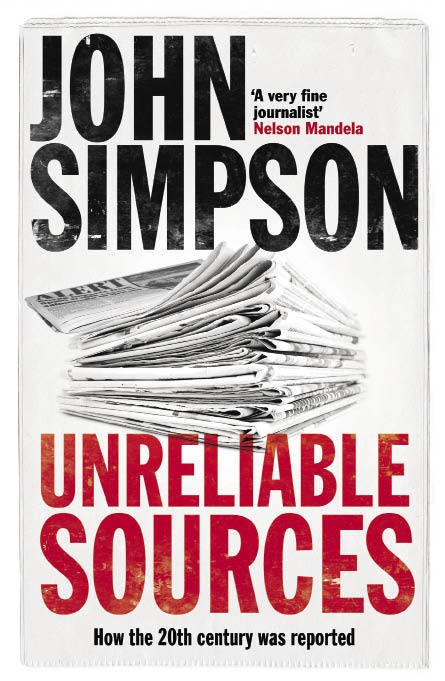John Simpson quotes Humbert Wolfe’s mischievous lampoon but makes it clear that, in spite of the somewhat disobliging title of his book, he does not accept it as fair comment.
You cannot hope to bribe or twist,
Thank God! The British journalist.
But seeing what the man will do
Unbribed, there’s no occasion to.
John Simpson quotes Humbert Wolfe’s mischiev- ous lampoon but makes it clear that, in spite of the somewhat disobliging title of his book, he does not accept it as fair comment. Himself one of the most resourceful and determined of journalists, he believes that most of his colleagues were and are hard-working and conscientious, anxious to write honestly and with due balance about the subject that they are covering; that most editors see it as their role to help rather than to hinder this process; and that most proprietors refrain from bringing pressure on their employees in a way that might lead to distortion of the truth. Most, but not all: there were, and always have been, discreditable exceptions in all three categories. Inevitably it is these who attract the most attention: it is the threats to the truth, the unreliability of the sources. which emerge most forcibly from Simpson’s lively and intelligent analysis of British journalism over the last century.
The reporting of wars in which British forces were involved takes up two-fifths of this book — perhaps too much, given that the fighting itself lasted only a dozen years at most and that the rules of reporting were wholly different in wartime. For one thing, the government could legitimately impose a degree of censorship which would have been wholly unacceptable in peace.
For another, once British forces were involved in battle, most reporters felt an obligation to support them and not to publish material that would damage their reputation or weaken the patriotic fervour of the civilians. Simpson censures the journalists who wittingly presented a false picture of life in the trenches during the first world war and quotes, with apparent approval, the editor of the News Chronicle as writing:
To men fighting for their lives day by day in the foulest of physical conditions it was nauseating to read, day after day, the lying official communiqués in the Press.
Fair enough — but if those journalists had told the horrific and unvarnished truth, how much damage might have been done to civilian morale, how many possible volunteers would have been deterred? One can be revolted by the humbug and yet still appreciate the feelings of the authorities, whose first task was to keep the war effort going until victory was achieved.
The urge to tell the public what it wanted to hear did not, of course, exist only in wartime. Editors, if they were to satisfy their proprietors, had to sell papers; journalists, if they were to satisfy their editors, had to produce copy that would attract readers: even the most fearless correspondents had to take some account of the popular taste. That was one of the main threats to honest reporting; another was the insidious pleasure of hob-nobbing with the great, the satisfaction of obtaining privileged, if carefully tailored information. The surprising thing is not how many editors and reporters succumbed to such pressures, but how many retained their pride and their integrity,
Simpson, as a good correspondent should, believes that the truth is sacrosanct and that, almost always, the truth should out. He considers that the abdication crisis was
one of the most dispiriting episodes for good reporting in the entire 20th century. Every single British newspaper abrogated its duty to tell people what was really going on, because its editor thought it would be intrusive, distasteful, disloyal, or damaging to do so.
Yet was their duty really that clear-cut? Would the public, or any other interest, have been served if, in those months in which the British remained ignorant of the incipient explosion, the papers had been full of speculative and salacious gossip about the royal scandal? It would have made no difference to the eventual outcome, merely have protracted and embittered a crisis which was damaging enough but mercifully short.
Simpson identifies one event and one individual as being particularly significant in the evolution of the press during the 20th century. The event was Suez, which, writes Simpson,
transformed British journalism. It obliged journalists to face up to one of the most difficult issues in any democracy: where their duty should lie at a time of intense disagreement on a subject of the greatest national importance.
The Press, and even more the BBC, gained a moral authority at that period which they were never wholly to surrender. The individual was Rupert Murdoch. Rothermere, fawning on Hitler, condoning the persecution of the Jews, might have been more distasteful, but Murdoch exercised far greater power and sustained Mrs Thatcher by
a constant flow of political propaganda in support of her approach and ideas, always loud and sometimes abusive, which masqueraded as news reporting.
And yet Simpson concedes that, by smashing the print unions, Murdoch gave ‘British newspaper journalism a new lease of life’. But for Murdoch, a man as independent-minded as John Simpson could never have enjoyed such international renown or have written a book as authoritative as it is enjoyable.






Comments